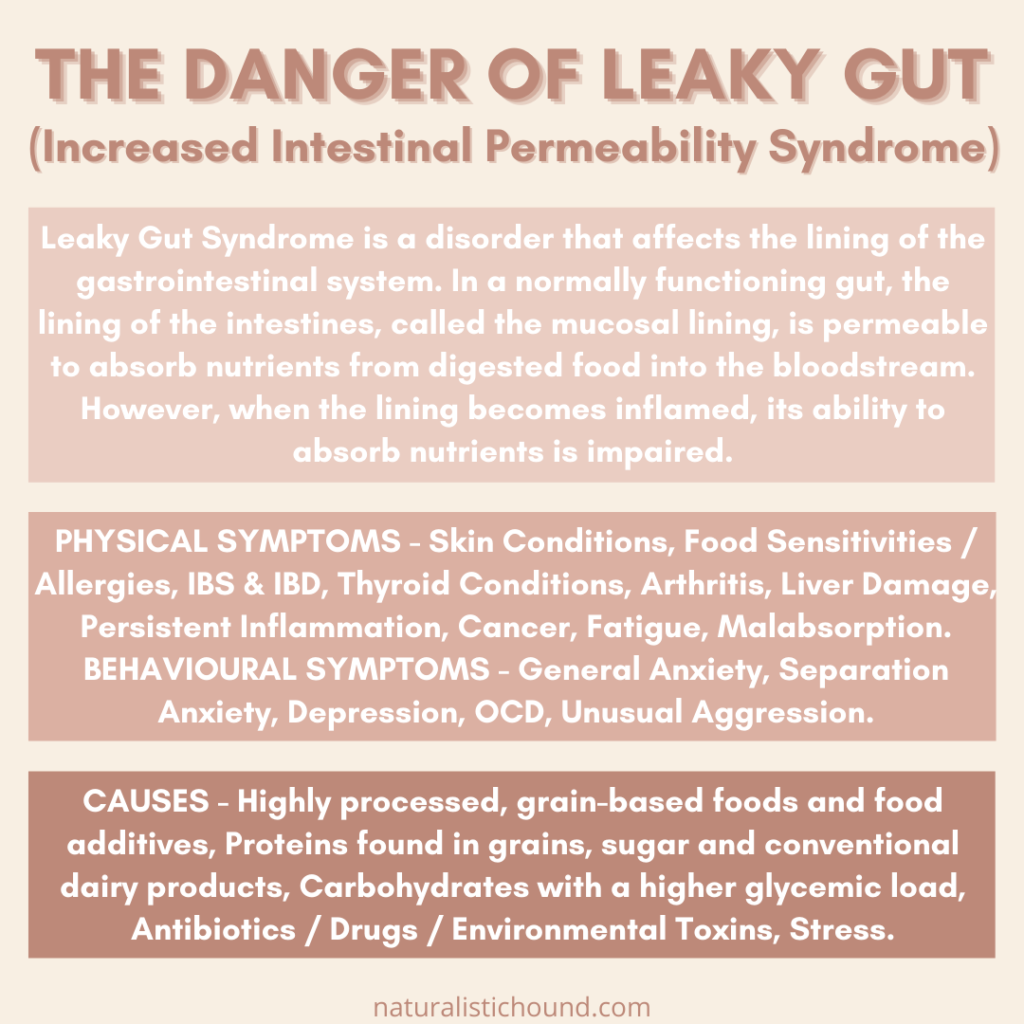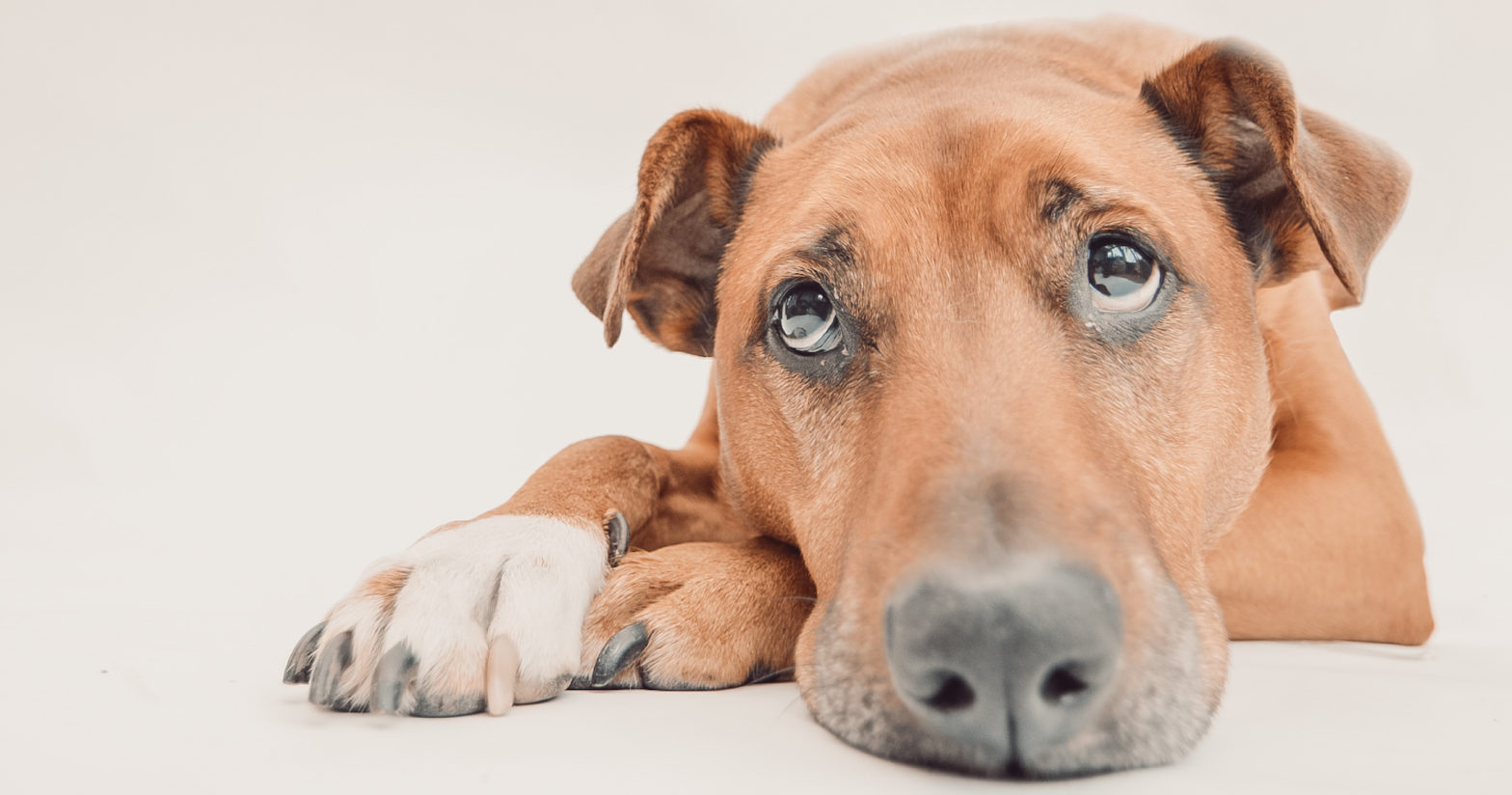Preventing the source of allergies, joint pain, digestive diseases, cancer and more…
It was the time that gut health became an important topic also when it comes to dogs.
Poor gut health and related diseases, such as Increased Intestinal Permeability Syndrome (also called Leaky Gut Syndrome), it’s a condition that affects people and pets and it has grown increasingly widespread.
Even though the issue starts in the gut, this can lead to many (too) common inflammatory diseases.
WHAT IS LEAKY GUT SYNDROME?
Leaky Gut Syndrome is a disorder that affects the lining of the gastrointestinal system. In a normally functioning gut, the lining of the intestines, called the mucosal lining, is permeable to absorb nutrients from digested food into the bloodstream. However, when the lining becomes inflamed, its ability to absorb nutrients is impaired.
- The mucosa contains small holes that normally only allows tiny, digested food particles to pass. The cells lining the intestinal wall are connected tightly and the tiny microvilli at the tips of the cells absorb and transport well-digested nutrients through the junctions and into the bloodstream.
- Leaky Gut occurs when these junctions open, allowing unwanted, bigger, molecules (such as undigested food, bacteria and toxins) to flow directly into the bloodstream.
- When undigested food and toxins enter the bloodstream, the immune system spots the foreign matter and starts fighting the intruders. The liver tries to remove the toxins from the body but because the attack is constant, it can’t keep up and the undigested proteins and toxins are soon absorbed into the body’s tissues – causing inflammation throughout the body.
- After a while, the body will start perceiving the foreign proteins as its own tissue proteins. This is called molecular mimicry, a process that leads the body to create antibodies against itself, which is the cause of autoimmunity disorders[1] (the most common autoimmune conditions include diseases of the skin, thyroid, joints, heart, spinal cord, eyes or brain, inflammatory bowel disease, collapsing trachea, laryngeal paralysis, liver, gallbladder and pancreatic disorders).

LEAKY GUT, PHYSICAL SYMPTOMS
There are different physical signs your dog can display in the case of Increased Intestinal Permeability Syndrome, the most frequent are:
⇝ Skin Conditions – If your dog develops allergies and dermatitis, with related rashes, hot spots, itchy/dry skin, or chronic skin infections then an imbalance in the gut could be the cause.
⇝ Food Sensitivities / Allergies – In the case of leaky gut undigested whole protein molecules go through the gut directly into its bloodstream, and this event is the precursor to sensitivities and allergies: proteins that used to be digested by the GI tract are now passing through the cell walls straight into the bloodstream together with bacteria. Your dog rises an immune response to these foreigner protein molecules, which will remember them for the future. The body then starts to recognise certain foods as it would do if it was a bacteria or virus.
⇝ IBS & IBD (Irritable Bowel Syndrome & Inflammatory Bowel Disease) – If your dog experiences recurrent diarrhoea, bloating, gas, abdominal pain and vomiting then an imbalance in his gut may be the issue at the source. IBS and IBD are telltale signs of an autoimmune reaction to undigested food particles that are leaking through the lining of the intestines.
⇝ Arthritis – Certain types of arthritis can be triggered or worsened by an imbalance in the gut microbiome, especially if a dog is predisposed to the condition.
⇝ Thyroid Conditions – When the immune system is overly under pressure, thyroid conditions such as Cushing’s Disease can be the next step. Symptoms of thyroid dysfunctions can include increased thirst, hair loss, increased appetite, weight gain.
⇝ Liver Damage – The liver must work constantly to filter the larger food particles and toxins that leak into the bloodstream. Over time, liver function can weaken, resulting in liver dysfunctions. Symptoms can include decreased appetite, vomiting, diarrhoea, increased thirst, and changes in stool colour.
⇝ Persistent Inflammation – The more a dog’s immune system is under pressure the weaker the immune system will get. Hence, more chronic inflammations will spread, from ear infections to upper respiratory tract infection.
⇝ Cancer – An inflamed intestinal barrier encourages the proliferation of some types of cancer[2].
⇝ Malabsorption – Leaky Gut and Malabsorption are two conditions that go hand-in-hand and there is often a high risk of malnutrition associated with them.
⇝ Fatigue – As a dog’s body is continually under attack by the toxins and food particles that keep entering his bloodstream, fatigue is inevitable. Lethargy and loss of interest in exercise and play are all possible symptoms.
LEAKY GUT, BEHAVIOURAL SYMPTOMS
And there can be also behaviour problems linked to Increased Intestinal Permeability Syndrome. Such as:
⇝ General Anxiety, Separation Anxiety, Depression – Leaky Gut has been linked to mood imbalances. The inflammation response that your dog’s body sends out due to the leakage may result in a variety of neurocognitive disorders.
⇝ OCD (Obsessive-Compulsive Disorder) – Changes in gut health can have intense effects on your dog’s mental and neurological state. Imagine all those toxins that leaked into the bloodstream, reaching the brain. Symptoms of OCD in dogs can include spinning, pacing, staring, tail chasing, and self-biting.
⇝ Aggression – Unusual aggression in dogs should always be a cause for alert. While there are many reasons for sudden aggression, poor gut health is one possibility since the brain, gut, and immune system are tightly interconnected. Moreover, the constant pain/inflammation your dog can find himself in, may push him over the edge more easily.
CAUSES AND HOW TO FIGHT LEAKY GUT
There are three main contributors to Increased Intestinal Permeability Syndrome. These are:
1) Diet
The number one contributor to Increased Intestinal Permeability is diet.
What should you avoid feeding your dog in order to prevent any inflammation of the gut lining?
✘ Highly processed, grain-based foods and food additives (such as preservatives – present in all commercial dog food).
✘ The proteins found in grains, sugar, genetically modified organisms and conventional dairy products, can most often damage your dog’s intestinal lining. Even if you don’t see them listed on the dog food packaging as ingredients, most food animals are fed these foods so they will be in your dog’s food too!
✘ Carbohydrates with a higher glycemic load also cause Intestinal Permeability. They are the preferred food source of many pathogenic bacteria. Over time, dogs eating a diet high in soluble carbohydrate will suffer from unbalanced bacteria in the gut (dysbiosis). Dysbiosis is one of the leading causes of Leaky Gut.
Always always always feed your dog an appropriate diet. Which doesn’t include commercial food.
Feed your dog home-cooked or raw food, grass-fed, organic meats are the best option. Also, adding organic vegetables is essential, as they will boost the meal with beneficial nutrients that meat doesn’t contain.
Include a good probiotic source in your dog’s diet such as plain goat yoghurt, goat kefir (yoghurt and kefir from goat or sheep milk are free of starch and inflammatory casein, but avoid all dairy products at once if your dog is sensitive to dairy), specific vegetables or dog-friendly natural probiotic supplements.
Eliminate all low-quality treats and food, especially the ones that include preservatives, additives and “unpronounceable” stuff.
Bone broth is another helpful ingredient to protect the gut lining. Bone broth is rich in amino acids that can be directly absorbed and utilised by the gut to repair itself. The gut is very high in two amino called glutamine and glycine, both of which are present in bone broth.
2) Stress
When dysbiosis is present, our pet’s tend to be more anxious or have other behavioural issues. However, extra stress puts more pressure on their microbiome. Every time your dog experiences stress, cortisol is released by your dog’s immune system which results in more inflammation. Make sure he is getting enough physical activity. Going for a walk every day is essential for his health and mental well-being. Many dogs develop stress and anxiety issues because they are not able to release excess energy. Looking after your dog’s state of mind is crucial for helping your dog to heal[3].
3) Antibiotics / Drugs / Environmental Toxins
Unfortunately, the entire world is full of toxins. We can control what is going on in our home, but we can’t do the same for the rest of the places your dog may visit.
Make sure you wipe your dog down with a wet cloth when you come back in from walks, and to rinse their paws, so they are not ingesting any toxin (pesticides, pollution etc) they have come into contact with from outside.
If your pet needs medications, make sure they absolutely need them. Conventional medications have an important use, but for a lot of conditions, it is advised to try natural, holistic treatments first which have little to none side effects for your dog’s microbiome.
Also, ensure that you are boosting your dog’s gut health and immune system adding foods rich in vitamins and antioxidants to his diet.
RELATED: Natural Vs Artificial Antioxidants
Do not underestimate or ignore Leaky Gut Syndrome in your dog.
For your dog to live a long, healthy and active life – you need to deal with the cause of diseases, not just their symptoms and by addressing Leaky Gut, you can help your dog to live his best life!
Let’s build a Healthy, Complete, Balanced & Personalised Diet for your Dog!
Naturalistic hound
Click here: Nutrition & Recipes
[1] Autoimmunity and the Gut
[2] Stronger intestinal barrier may prevent cancer in the rest of the body
[3] Stress, depression, diet, and the gut microbiota: human–bacteria interactions at the core of psychoneuroimmunology and nutrition


One thought on “Leaky Gut Syndrome”
Comments are closed.